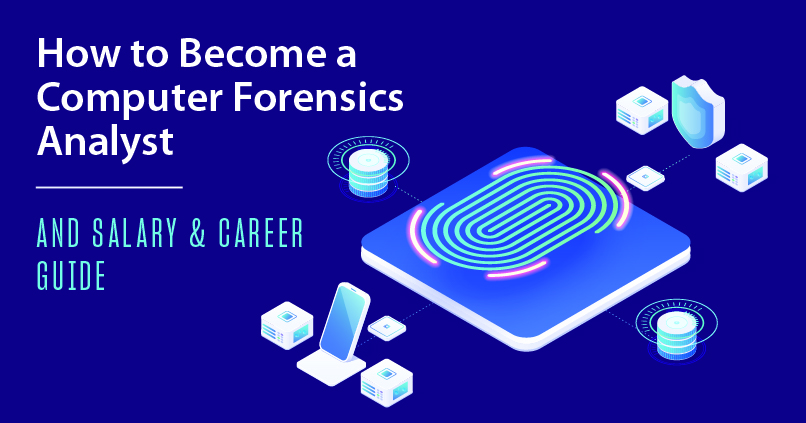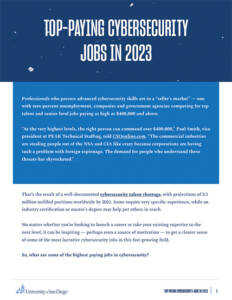It’s no secret that forensics — DNA, fingerprints, blood, saliva, etc. — are crucial components of any crime scene and investigation. They can make all the difference in solving a crime, and digital cases where evidence is left behind by cyber criminals are no different. That’s where skilled computer forensics analysts come in.
It’s no secret that forensics — DNA, fingerprints, blood, saliva, etc. — are crucial If you have strong computer and networking skills and like the idea of being a bit of a detective, perhaps you should consider a career as a computer forensics analyst. As The Balance Careers puts it: “If you enjoy problem-solving and investigation, and you are skilled not only in using a computer but also in digging deep into computer systems, forensic computing may be the perfect career path for you.”
Whether you’ve been thinking about working in computer forensics or the idea has just crossed your mind, let’s explore this popular, high-demand position.
What Does a Computer Forensics Analyst Do? (+ Average Day)
Paths to Becoming a Computer Forensics Analyst
Computer Forensics Analyst Hard Skills
Computer Forensics Analyst Soft Skills
Education Required for a Computer Forensics Analyst
Computer Forensics Analyst vs. Other Similar Titles
How to Move Up the Computer Forensics Analyst Ranks
Companies (By Industry) Hiring Computer Forensics Analysts
Computer Forensics Analyst Career Outlook
How Much Does a Computer Forensics Analyst Make?
FAQs About Computer Forensics Analyst Careers
Take Your Computer Forensics Analyst Career to the Next Level
What is Computer Forensics?
Computer forensics is a branch of forensics that deals with digital evidence examined and collected for legal proceedings. Here are a few other definitions:
“Digital forensic science is a branch of forensic science that focuses on the recovery and investigation of material found in digital devices related to cybercrime. The term digital forensics was first used as a synonym for computer forensics. Since then, it has expanded to cover the investigation of any devices that can store digital data. Although the first computer crime was reported in 1978, followed by the Florida Computers Act, it wasn’t until the 1990s that it became a recognized term. It was only in the early 21st century that national policies on digital forensics emerged.” EC-Council
“[Computer forensics] specializes in the scientific analysis of computer communications and the data on computer storage devices.” The Balance Careers
The United States Department of Homeland Security offers this definition of cyber forensics, which is often interchangeable with computer forensics: “The role of computers and portable media devices such as cell phones and GPS devices in criminal activity has increased significantly in recent years. Accordingly, these devices frequently contain vital evidence, including user information, call logs, location information, text messages, emails, images, and audio and video recordings.”
What Does a Computer Forensics Analyst Do? (+ Average Day)
The exact day-to-day responsibilities will vary depending on the position, but here are some typical responsibilities of a computer forensic analyst:
- Investigate, uncover and gather evidence of illegal activities conducted through a computer. These crimes can range from credit card fraud and intellectual property theft to pedophilia, terrorism and hacking.
- Investigate and uncover evidence of crimes in which computers were used for storing evidence.
- “Legal” or “ethical” hacking, which means breaking into computer systems on purpose in an attempt to understand a hacker’s strategies, motivations and modus operandi in order to block intruders from illegally infiltrating networks and systems to engage in criminal activity.
Paths to Become a Computer Forensics Analyst
According to Cybersecurity Guide, you typically need a bachelor’s degree in computer science, computer forensics, cybersecurity or a related field. Many companies/organizations prefer professionals with at least few years of experience, even if you have a related degree. Internships are a good way to obtain on-the-job experience and see if a computer forensics career is right for you.
Computer Forensics Analyst Hard Skills
A computer forensics analyst or investigator must rely on a combination of specific computer and networking knowledge and skilled investigative techniques. Hard skills needed typically include knowledge of file formats, software drivers, networking routing, security, computer forensic tools and cryptology.
As The Balance Careers explains, “…digital forensic experts need to have a vast array of knowledge regarding computers, on both the hardware and software sides. They must have intricate knowledge of computer operating systems, including the BIOS, and should be very familiar with Linux, Mac OS, and Windows.”
Computer Forensics Analyst Soft Skills
A computer forensics analyst position requires more than just computer and software knowledge. Other skills that employers are looking for when it comes to IT jobs include analytical abilities, creativity, project management, perseverance, problem solving, resourcefulness, curiosity and an interest in helping others.
Certifications Required
Certifications may be necessary, depending on the position. Even if they aren’t required, obtaining one may demonstrate your dedication to furthering your expertise — and it may just help you land that coveted role. These are some of the most common certifications for this type of position:
- The Certified Information System Security Professional (CISSP)
- The National Computer Forensics Institute (NCFI) offers digital forensic courses
- The National Initiative for Cybersecurity Careers and Studies (NICCS) offers certificate programs in digital forensics and cybersecurity
- Certified Digital Forensics Examiner program
- Certified Computer Examiner from the International Association of Forensic Computer Examiners
- Certified Forensics Analyst from the Global Information Assurance Certification Organization
Education Required for a Computer Forensics Analyst
In most cases, you need a bachelor’s degree in computer forensics or a related degree (computer science, criminal justice, engineering, etc.) with computer forensics training, according to The Balance Careers. Some companies/organizations may accept equivalent knowledge/experience in place of education. A master’s degree is typically not required (though it may depend on the position), but obtaining one can demonstrate your willingness to further your cyber education and advance your career.
Computer Forensics Analyst vs. Other Similar Titles
If you search for “computer forensics analyst” or “computer forensics investigator” you’ll likely come across a variety of related and overlapping job titles. Here are some of the most common, which may have similar responsibilities as a computer forensics analyst:
- Digital forensics analyst
- Malware forensics analyst
- Computer network analyst
- Cybersecurity analyst
- Forensic analyst
- Cryptographic vulnerability analyst
- Threat response analyst
- Incident response analyst
- Cyber forensics analyst
- Lead digital forensics analyst
- Computer forensic and intrusion Analyst
- Cybersecurity incident response engineer
- Security intelligence analyst
- Surveillance investigator
- Forensic data analyst
- Financial crime investigator
All of these positions may have slightly different responsibilities, so it’s best to look closely at the job description.
How to Move Up the Computer Forensics Analyst Ranks
Internships and experience are two of the best ways to move up the ranks. An advanced degree in a related field — such as cybersecurity, computer science or digital forensics — may also be helpful, as it demonstrates your commitment to education and furthering your career. Professional certifications are also important for the same reasons.
Companies (By Industry) Hiring Computer Forensics Analysts
Job postings are constantly changing, but here is a list of notable companies courtesy of LinkedIn and Indeed that have recently posted for this type of position.
Information Technology and Services
- Dell Technologies
- Microsoft
- Amazon
- Verizon
Automotive
- Ford Motor Company
- General Motors
- Tesla
- Nissan Motor Corporation
- Harley-Davidson Motor Company
Financial Services
- Fidelity Investments
- Mastercard
- Wells Fargo
- Capital One
- Morgan Stanley
Retail/Entertainment/Consumer Goods
- Target
- Columbia Sportswear Company
- Crate & Barrel
- Dick’s Sporting Goods
- Tiffany & Co.
- L.L. Bean
- Walmart
- Colgate-Palmolive
- PlayStation
Sports/Entertainment
- Major League Baseball
- Wynn Las Vegas
- NBCUniversal
- TikTok
- Fan Duel
Healthcare
- CareFirst BlueCross BlueShield
- Brigham and Women’s Hospital
- Cleveland Clinic
- Pfizer
Government, Defense & Space
- National Security Agency
- U.S. Postal Service
- Booz Allen Hamilton
- U.S. Department of the Treasury
- Lockheed Martin
- Manhattan District Attorney’s Office
Education
- New York University
- Pearson
- Villanova University
Computer Forensics Analyst Career Outlook
IT and cybersecurity sectors careers are fast-growing, and computer forensics analyst positions are no different. This position is closely related to information security analyst, which is projected to grow by 31% from 2019 to 2029 (much faster than the national average for all occupations), according to the U.S. Bureau of Labor Statistics.
The good news is that there is high demand across a wide variety of industries — and in both public and private sectors. InfoSec Institute reports that the outlook is especially favorable for analysts with master’s degrees and relevant certifications.
How Much Does a Computer Forensics Analyst Make?
Your salary will depend on a number of factors, including job responsibilities and how much experience is required, but the average is around $75,000; they can range, however, from $50,000 to $115,000. PayScale lists the average base salary around $74,00 while ZipRecruiter lists a higher average annual pay of $100,000. Information security analysts, which is a closely related position, make around $103,000 annually. It’s important to note that salary information is updated in real time, and the numbers listed here reflect the average at the time this guide was written.
FAQs About Computer Forensics Analyst Careers
Take Your Computer Forensics Analyst Career to the Next Level
This career guide is brought to you by the University of San Diego — a highly regarded industry thought leader and education provider that offers a 100% online Master of Science in Cyber Security Operations and Leadership. This degree program features practical, cutting-edge curriculum taught by expert instructors who share insights drawn from highly relevant industry experience.





